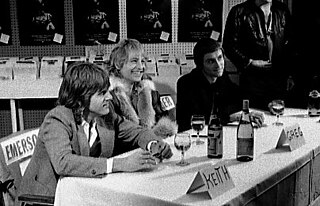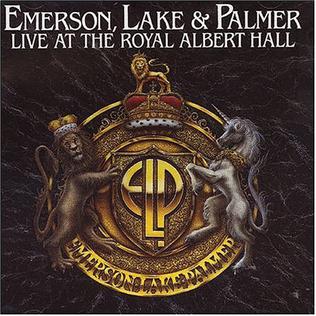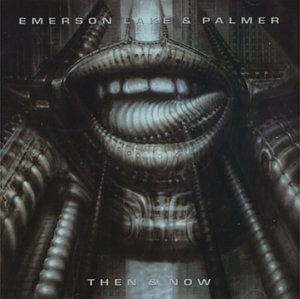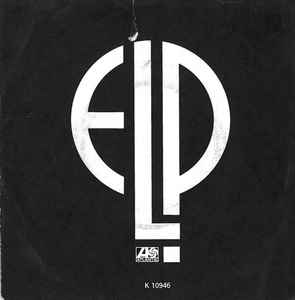
Emerson, Lake & Palmer were an English progressive rock supergroup formed in London in 1970. The band consisted of Keith Emerson (keyboards) of the Nice, Greg Lake of King Crimson, and Carl Palmer of Atomic Rooster. With nine RIAA-certified gold record albums in the US, and an estimated 48 million records sold worldwide, they are one of the most popular and commercially successful progressive rock groups of the 1970s, with a musical sound including adaptations of classical music with jazz and symphonic rock elements, dominated by Emerson's flamboyant use of the Hammond organ, Moog synthesizer, and piano.

Keith Noel Emerson was an English keyboardist, songwriter, composer and record producer. He played keyboards in a number of bands before finding his first commercial success with the Nice in the late 1960s. He became internationally famous for his work with the Nice, which included writing rock arrangements of classical music. After leaving the Nice in 1970, he was a founding member of Emerson, Lake & Palmer (ELP), one of the early progressive rock supergroups.

The Best of Emerson, Lake & Palmer is an album by British progressive rock band Emerson, Lake & Palmer, released in 1994. This supersedes a 1980 compilation with a shorter, different track list and Japanese ukiyo-e cover designed by Richard Evans.

Pictures at an Exhibition is a live album by English progressive rock band Emerson, Lake & Palmer, released in November 1971 on Island Records. It features the group's rock adaptation of Pictures at an Exhibition by Modest Mussorgsky, performed at Newcastle City Hall on 26 March 1971.

Tarkus is the second studio album by English progressive rock band Emerson, Lake & Palmer, released on 14 June 1971 on Island Records. Following their debut tour across Europe during the second half of 1970, the group paused touring commitments in January 1971 to record a new album at Advision Studios in London. Greg Lake produced the album with Eddy Offord as engineer.

Trilogy is the third studio album by English progressive rock supergroup Emerson, Lake & Palmer, released in June 1972, by Island Records. The group had spent most of 1971 touring, and paused in September so they could record a new album at Advision Studios with Eddy Offord resuming his role as engineer. It would be his last with the group, as he later elected to work full-time with Yes. The album features "Hoedown", an arrangement of Aaron Copland's ballet composition which became a live favourite.

Manticore Records is a record label launched by the Manticore production company in 1973. These companies were owned by the members of the progressive rock group Emerson, Lake & Palmer and their manager, Stewart Young. The manticore was first featured in the artwork for the second ELP album Tarkus, as one of the eponymous creature's adversaries. Manticore was initially the name given to ELP's music publishers, credits first appearing in the credits on Trilogy, released on Island in 1972.

Emerson, Lake & Palmer is the debut studio album by English progressive rock band Emerson, Lake & Palmer. It was released in the United Kingdom by Island Records in November 1970, and in the United States by Cotillion Records in January 1971. After the group formed in the spring of 1970, they entered rehearsals and prepared material for an album which became a mix of original songs and rock arrangements of classical music. The album was recorded at Advision Studios in July 1970, when the band had yet to perform live. Lead vocalist and bassist/guitarist Greg Lake produced it.
"Tarkus" is the title track of Emerson, Lake & Palmer's second album. The progressive rock epic lasts 20:35. It was the longest studio suite by the band until the three impressions of "Karn Evil 9". The name "Tarkus" refers to the armadillo-tank from the William Neal paintings on the album cover. The artist has explained that the name is an amalgamation between 'Tartarus' and 'carcass'. Consequently, the name refers to the "futility of war, a man made mess with symbols of mutated destruction." The song "Tarkus" supposedly follows the adventures of Tarkus from his birth, through a fight with a manticore, which he loses and concludes with an aquatic version of Tarkus named "Aquatarkus". Keith Emerson, when asked what work he is proudest of, named his "Piano Concerto" and "Tarkus".

Live at the Royal Albert Hall is a live album by Emerson, Lake & Palmer. It was recorded at two concerts at the Royal Albert Hall during the Black Moon tour in early October 1992.

The Return of the Manticore is a 4-disc retrospective on the career of the band Emerson, Lake & Palmer. It was released in 1993, and features several new recordings of previously released songs, most notably a studio recording of "Pictures at an Exhibition," presented in Dolby Surround Sound. Also, a live recording of Dave Brubeck's "Rondo" features on disc 2; the track, although performed by ELP in concert from the band's inception, was previously unreleased on any live or studio album by ELP. This rendition was recorded at the Lyceum Theatre on December 9, 1970.

Then and Now is a live album by British progressive rock band Emerson, Lake & Palmer, released in 1998.

King Biscuit Flower Hour: Greatest Hits Live is a compilation live album by the progressive rock supergroup Emerson, Lake & Palmer. It features tracks from two different tours: The 1973–1974 Brain Salad Surgery Tour, and the 1977 Works Tour.

Live in Poland is a live album by the progressive rock group Emerson, Lake & Palmer. It features a performance in Katowice, Poland, during June 1997. The performance was originally released exclusively in Poland in 1997, with a different cover, by Polish music company Metal Mind Productions. It would be released internationally for the first time at Austria in 2001, and for the rest of the world during April 2003.

The Road Home is a cover album by Jordan Rudess. It was released on September 12, 2007.

Vivacitas is a live album recorded by the Nice, who reformed for a set of concerts, augmented by the Keith Emerson Band for the second half of the concert. David O'List, The Nice's original guitarist, did not take part, and was replaced by Dave Kilminster. The album consists of versions of pieces which had been live favourites during the Nice's heyday between 1967 and 1970, three piano solo pieces by Emerson, some pieces from the Emerson, Lake & Palmer repertoire performed by the Keith Emerson Band, and a 2001 interview with Emerson, Lee Jackson and Brian Davison by Chris Welch.

High Voltage is a double live album by British progressive rock band Emerson, Lake & Palmer, released in 2010.

Live at Nassau Coliseum '78 is a double live album by British progressive rock band Emerson, Lake & Palmer, released in 2011.

Live at the Mar y Sol Festival '72 is a live album by British progressive rock band Emerson, Lake & Palmer, released in 2011. It was recorded on 2 April 1972 at the Mar y Sol Pop Festival in Puerto Rico.

"Fanfare for the Common Man" is an instrumental piece of music adapted and played by the English progressive rock band Emerson, Lake & Palmer, from the group's 1977 Works Volume I album. Adapted by Keith Emerson from Aaron Copland's 1942 piece of the same name, it is one of their most popular and enduring pieces.



















